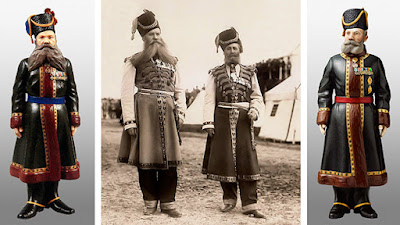A Treasure In The Attic
To find a Fabergé piece lost in an attic for 79 years and sell it in less than 15 minutes for close to $6 million must be the ultimate thrill in auctioning. The object in question was a carved hard-stone replica of N.N. Pustynnikov, the personal bodyguard from 1894 to 1917 of Empress Alexandra Feodorovna (1872–1918). In a 2015 interview with the authors, Colin Stair of Stair Galleries described the rediscovery of the Fabergé figure in an attic in Rhinebeck, New York, and the October 2013 auction with one word: “Amazing!”
Between 1908 and 1916, the workshops of the Russian court jeweler Carl Fabergé created approximately 50 hard-stone figures representing the Russian people, including peasants, merchants, noblemen, and soldiers. Made from gems and precious metals, they are as rare as the well-known Imperial Easter eggs. The last Romanov emperor, Nicholas II, owned 21 of these portrait figures, two of which depict the Cossack bodyguards of the Romanov empresses. This article examines the hard-stone figures through known biographical details, archival photographs of the Chamber Cossacks Kudinov and Pustynnikov, an original production sketch, and an invoice from the Fabergé firm.
Read more about the history and creation of these amazing works of jewels and art below.

